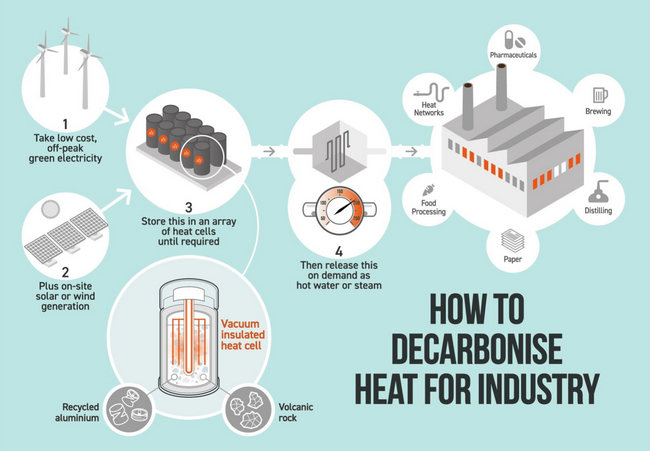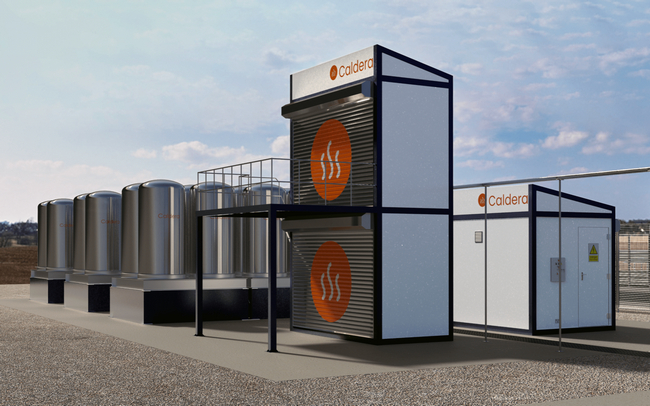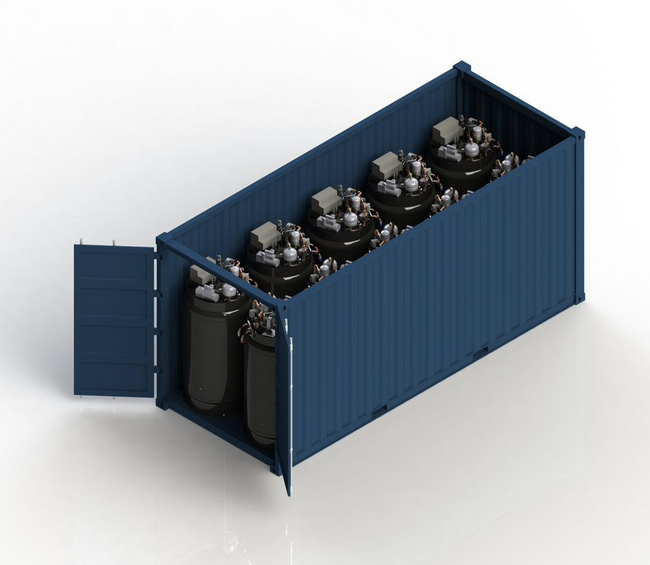Displaying items by tag: Caldera
Caldera partners with Manufacturing Technology Centre to design heat cell gigafactory
Heat storage specialist Caldera has engaged the Manufacturing Technology Centre (MTC) to design a heat cell gigafactory to mass manufacture its unique low carbon heat storage system at scale. The company plans to commence commercial production in 2025 and scale up rapidly thereafter, with thousands of heat cells being rolled out UK-wide.
In June, Caldera was awarded £4.3 million from the UK Government to develop its groundbreaking industrial heat storage technology – which takes cheap, green off-peak electricity and onsite solar and stores it in heat cells made of scrap aluminium and volcanic rock, ready to be released as hot water or steam when required.
The heat pioneers have already piloted the technology in homes across the south of England, where small-scale boilers delivered low carbon hot water and heating to a number of domestic customers.

Caldera is using the £4.3 million fund to build a full-scale industrial electric storage demonstrator – comprising up to 20 heat cells – at its base in Hampshire. The demonstrator will deliver process steam between 80 and 200℃, the ideal temperature for around 31 percent of the UK’s total industrial heat demand, in sectors including pharmaceuticals, food manufacturing and brewing.
The Manufacturing Technology Centre specialises in advising business on the latest manufacturing techniques and Caldera has now brought the MTC on board to design a new gigafactory to mass produce its electric boiler for a UK and global market.
“To date, all of our manufacturing has been on a near-bespoke unit-by-unit basis which is labour intensive with a high unit cost,” states Caldera CEO James Macnaghten.
“In order to drive down costs and meet growing future demand we need to explore how we can scale rapidly and automate as many processes as possible. A great benefit of our system is it is modular – our electric boiler is made up of multiple highly insulated cells, each of which is relatively small at around two metres high – and this really lends itself to manufacturing at scale,” James says.
Caldera has engaged the Manufacturing Technology Centre to define an efficient and lean method of manufacturing (MoM) and assembly for high volume production, to design a suitable factory layout and simulate in 3D the manufacture and assembly sequence of the product as a ‘virtual build’.

It is anticipated this will include automated production with robotics and state-of-the-art-processing. Work on the project has commenced already and will complete in late 2024 – giving Caldera a greenprint for production facilities which can be built in the years ahead.
“Industry is a major user of heat, and typically this is provided by steam boilers that burn gas or oil,” James continues.
“Our product delivers process heat at the sweet spot which many industries need. With continuing pressure to decarbonise we believe there will be strong global demand for Caldera’s electric storage boiler which offers a low cost, low carbon alternative to fossil fuel.
“Our partnership with the MTC will enable us to design a gigafactory with the very best technologies and processes baked in. Once demand for our product has risen sufficiently, we will then be able to build the facilities we need to scale up rapidly and roll out a commercial product with a vast potential market worldwide,” James concludes.
MTC’s Director of Power and Energy Matthew Kite said:
“We are delighted to be supporting Caldera in such a high-profile project, to rapidly automate and upscale their processes, ultimately in support of decarbonisation.
“We have a proven record across many different industrial sectors in defining efficient manufacturing operations and management (MOM) and assembly for volume production and this project aligns perfectly with the MTC’s support of the UK’s drive to ‘net zero’, where we are also working in many sectors such as hydrogen, nuclear power, offshore and onshore wind and in clean maritime.”
About Caldera
Caldera's mission is to eliminate fossil fuels by storing renewable energy as heat, ready to be used when required.
Caldera’s systems can replace or supplement any industrial or commercial fossil fuel boiler. They cut carbon, and when paired with on-site solar or wind also cut costs. For businesses that need process heat they provide the same energy storage benefit as batteries more affordably, and can generate high temperature hot water or steam up to 10bar.
Caldera's solution is affordable, safe, scalable and durable.
About The Manufacturing Technology Centre
Established in 2010, The Manufacturing Technology Centre (MTC) is an independent Research & Technology Organisation with the objective of bridging the gap between university-based research and the development of innovative manufacturing solutions, in line with the Government’s manufacturing strategy. The MTC is part of the High Value Manufacturing Catapult, supported by Innovate UK.
Housing some of the most advanced manufacturing equipment in the world, the MTC works in partnership with industry, academia, and its members to prove innovative manufacturing processes and technologies. The MTC’s areas of expertise are applicable across a wide variety of industry sectors, including Aerospace, Defence & Security, Power & Energy, Built Environments, Space, Food & Drink and Healthcare.
In addition, MTC Training is creating the next generation of engineering talent while upskilling and reskilling existing workforces to support the industry and accelerate technological adoption. The MTC Apprenticeship programme helps learners develop the skills needed for delivering the technologies of the future in the high value manufacturing sector.
For more information visit: www.the-mtc.org
Caldera secures £295k to decarbonise industrial steam
Caldera Heat Batteries has secured a £295,000 grant from the Department of Business Energy & Industrial Strategy (BEIS) for a feasibility study on how to roll out thousands of Warmstone heat batteries for use in industrial settings.
- Caldera is designing a factory to mass-produce heat batteries
- Potential to decarbonise many existing industrial processes reliant on high-temperature steam
- Roll out will support the rapid decarbonisation of British industry
The Southampton firm has developed, and already begun to deploy in residential settings, a zero-carbon heat battery, known as Warmstone, which stores heat energy using renewable electricity (either off-peak or generated on-site) and can be released when required as high-pressure steam – the main source of heat for many industrial processes including pharmaceuticals, food processing and brewing.
They have received £295,478 Phase 1 funding from the BEIS Industrial Fuel Switching competition to investigate the design and build of a UK factory capable of rolling out Caldera heat batteries to support the rapid decarbonisation of British industry.

Commenting on the award Caldera CEO James Macnaghten, says:
“Industrial steam makes up 31 percent of the UK’s total industrial process heat requirement. This is normally provided by multiple steam boilers and accumulators that burn natural gas or oil.
“Warmstone is a direct replacement that can provide steam on demand. Single or multiple units contain solid Warmstone material which can be heated up using cheap off-peak electricity and on-site renewables such as solar PV which can be stored with very high efficiency until needed.
“Banks of Warmstone heat batteries can then deliver high-pressure steam as required at temperatures up to 200C. This will enable factories to switch off fossil fuels as their primary fuel source, enabling an easily adopted route to low carbon electrical power.
“In addition, industrial steam boilers and steam accumulators store large quantities of superheated water, which brings significant cost and safety implications requiring continuous manning and detailed annual inspection.
“The adoption of Warmstone heat batteries avoids these risks due to the low quantity of water used without combustion,” Macnaghten concludes.
Energy and Climate Change Minister Greg Hands said:
“As we accelerate the UK’s energy independence by boosting clean, home-grown, affordable energy, it’s crucial that our industries reduce their reliance on fossil fuels.
“This investment will help them to not only cut emissions but also save money on energy bills, on top of supporting jobs by encouraging green innovation across the UK.”
According to the UK Government, industry accounted for 16 percent of UK greenhouse gas emissions in 2018, making it the third-largest emitting sector – therefore meeting the Net Zero target requires near-complete decarbonisation of UK industry. The Committee on Climate Change (CCC) estimated that decarbonising industry will take c. £8 billion in public and private investment a year.
The BEIS Industrial Fuel Switching competition aims to address this by providing innovation funding, as part of the £1 billion Net Zero Innovation Portfolio, to develop fuel switching and fuel switch enabling solutions for industry, while building the UK’s decarbonisation skills and supply chain.
The competition supports the recently published Industrial Decarbonisation Strategy (March 2021), which identified that government investment is required to advance the development of low carbon technologies to address the barrier around uncertainties associated with novel technologies for the private sector.
